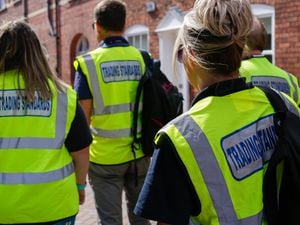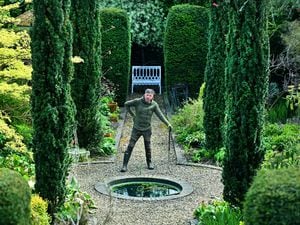Ding, dong, the bells aren’t going to chime: Religious weddings on the decline
The first bars of Wagner’s Bridal Chorus reverberate from a church organ, and the congregation turn to watch the blushing bride-to-be walks down the aisle.
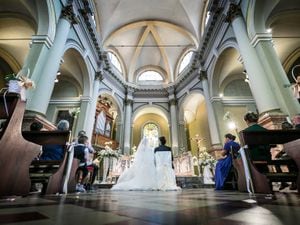
For many people, there is no other way to begin a wedding, and the peal of the bells and the throaty bellow of the church organ are a key part of that traditional vision.
But religious weddings in churches and other religious venues are on the decline..
In England only a quarter of marriages were held in religious venues between 2011 and 2016.
Of those, most were in Christian churches, while non-Christian religious marriages amounted to only four per cent of the total.
Reverend James Treasure from St Thomas and St Luke in Dudley, also known as Top Church, says that the church has to shoulder some of the blame for the change in marriage .
“There has been a decline in weddings and vicars are talking about it,” he says.
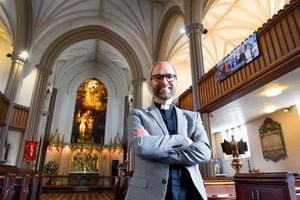
“As churches we have to take some of the blame. We have failed in engaging with this generation. When people think about getting married now they don’t think about getting married in a church.”
Kanak Ghosh, from the ONS, says marriage rates as a whole remain at historical lows despite a small increase in the number of people who got married in 2016.
“Most couples are preferring to do so with a civil ceremony,” he says.
That decline in religious weddings has been reflected in the West Midlands.
Holy weddings are down 22 per cent in Wolverhampton, by 14 per cent in Sandwell, 27 per cent in Telford, 34 per cent in Dudley, 28 per cent in Walsall, 13 per cent in Shropshire and 14 per cent in Staffordshire.
There are plenty of alternatives these days. Anyone wanting a non-traditional wedding can get hitched at anywhere from a football stadium – Molineux and Shrewsbury’s Montgomery Waters Meadow are among the licensed premises – to tourist landmarks like the Severn Valley Railway, Drayton Manor Theme Park, Blists Hill Victorian Town, or the caves at the Black Country Living Museum.
Then there are the locations which are capitalising on the boom in unusual locations for wedding ceremonies. The Crooked House, the peculiar, sloping pub in Dudley, may make your guests feel a little more tipsy than they really are, for example.
But Hannah Richardson, 33, and her husband Michael, 31, married at St Luke’s Church at Weston-Under-Redcastle in north Shropshire, and thought it offered something a secular ceremony could not.
It was Hannah’s family connections that bought her to that church as her grandmother had lived there and she had been bought up nearby.
“I wanted to do the traditional thing. We have both been married before and the first time I got married wasn’t in a church,” says Hannah. “It is not always very easy to get married in a church if you’ve been divorced, but the church was so accommodating and the vicar was amazing and knows that life pans out in different ways.
“Most people would say they got married in a church for religious purposes, but that wasn’t our main reason. The focus of the ceremony was all about love and friendship and about us and our relationship. Yes, there were hymns but it was personalised and exactly how we wanted it.
“When you get married in a church they are so helpful and go above for you because not many people do now, something which you don’t get from a registrar necessarily.
“I just don’t think hotel weddings compare.”
Ruth Jacobs is chairman of the Representative Council of Birmingham & West Midlands Jewry and she says that as with most other walks of life there are people within the Jewish community who co-habit but are not married.
“It’s not acceptable as far as Jewish law is concerned,” she adds. “But there are lots of Jewish people that are not married but are living together. I suppose many have the same fear of divorce, that it’s not going to be right. Ideally most Jewish parents would like to see their children married and most Jewish people do end up being married in the end.”
According to Mrs Jacobs one of the big issues in the West Midlands is that the Jewish faith is losing young people who are moving away form the area. In her own synagogue she says there has only been one wedding in the last five years.
“There are a lot of young Jewish people who move away, they don’t stay here,” she says. “We don’t see the same influx as we do outflux.”
Reverend Protopresbyter Stephen Maxfield is the priest-in-charge at the Greek Orthodox Church in Shrewsbury and he says that the church has been holding a consistent number of weddings year-on-year and has not noticed a particular decline.
“We are not typical,” he says. “The average age of our congregation is about 35. We still have a significant number of young married couples.”
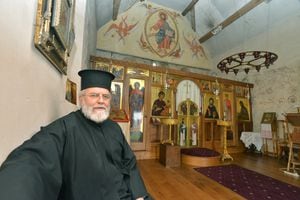
Those who get married at the Greek Orthodox Church must first be married at the registry office, because the church’s weddings are not recognised by the British state.
Despite the church not seeing a reduction in weddings, Mr Maxfield says he can see why religious ceremonies as a whole have decreased.
“If the state allows you to have your wedding in a hotel or the same place where the reception is going to be held then it is inevitable that people are going to take that option,” he says. “Guests are all together in one place and it would be considered less hassle. I should imagine for those churches which rely on weddings for income this is pretty catastrophic.”
Are religious wedding ceremonies destined to continue to decline, or is there something that can be done to turn it around for these institutions?
Rev Treasure says the key is getting people to realise the church is there.
“There are people who are religious, but they don’t engage with church,” he says.
“We could offer more support for local people after they are married and also to prepare them for marriage so it creates more of a story.
“But really it’s about how the church engages with the whole community. If we are more active people will get to know the vicar, get to know the building and then people will start to think of the church.”

